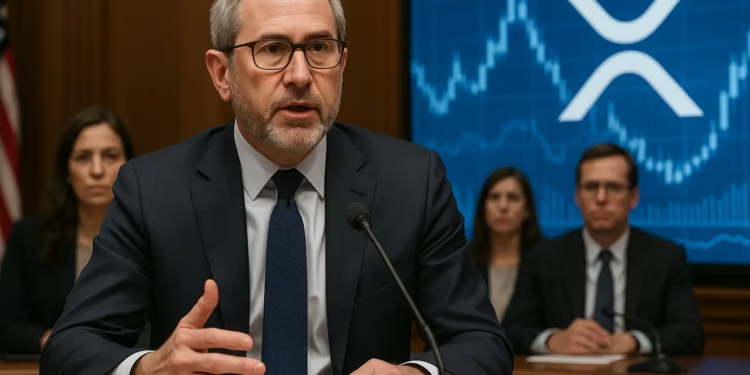Ripple Labs has formally submitted its comments to the U.S. Senate Banking Committee, emphasizing the urgent need for clearer regulatory definitions in the proposed Crypto Market Structure Bill. The submission, part of the Committee’s Request for Information (RFI) process, marks another pivotal moment in Ripple’s ongoing XRP regulatory push and broader efforts to shape the legal landscape for digital assets in the United States.
The company’s response was announced via X (formerly Twitter) by Stuart Alderoty, Ripple’s Chief Legal Officer.
“We appreciate the Committee’s invitation to contribute,” Alderoty wrote, adding that Ripple’s decade-long work with global regulators, and its legal challenges with the U.S. Securities and Exchange Commission (SEC), gives it a “unique and hard-earned perspective.”
The proposed legislation seeks to establish clearer market structure rules for digital assets, but Ripple argues that the bill as drafted leaves too much ambiguity, particularly regarding which federal agency, SEC or Commodity Futures Trading Commission (CFTC), should oversee which types of assets.
XRP regulatory push highlights blurry SEC-CFTC boundaries
Ripple’s central critique is that the bill’s effort to divide regulatory responsibilities between the SEC and CFTC is too vague. The company warns that this lack of clarity could deepen existing confusion in an already fragmented regulatory environment, undermining confidence for crypto investors and businesses alike.
“The current draft risks perpetuating jurisdictional turf wars that delay innovation and leave U.S. companies guessing which rules to follow,” Ripple wrote in its official response.
The firm urged lawmakers to incorporate language from the CLARITY for Digital Tokens Act, which offers firmer guidelines to determine whether a digital asset is a security or a commodity. Under Ripple’s proposal, open-source tokens operating for more than five years on decentralized networks would be presumed non-securities, removing them from the SEC’s reach and minimizing regulatory uncertainty.
“Congress must act to ensure regulatory clarity, not regulatory chaos,” said Alderoty. “Without clear agency boundaries, we’ll continue to see the SEC assert jurisdiction over assets that function more like commodities.”
SEC overreach, enforcement tactics under scrutiny
Ripple also raised broader concerns over what it calls “regulation by enforcement” a reference to its high-profile legal clash with the SEC over XRP’s classification. While a federal judge ruled partially in Ripple’s favor in 2024, stating that XRP was not a security when sold on public exchanges, the case has become a flashpoint in the larger XRP regulatory push.
“Subsidizing crypto mining risks distorting energy markets,” — IMF spokesperson, in a statement to Independent Urdu.
Ripple warned that the bill’s current language allows future SEC chairs to stretch definitions and reassert control over decentralized networks through lawsuits, rather than laws. To counter this, the company recommends codifying the Howey Test, a longstanding legal framework for determining what qualifies as a security, but doing so in a way that respects crypto’s unique architecture.
“If the Howey Test is to be used, Congress must define its application in the context of decentralized systems,” Ripple noted. “Otherwise, enforcement will remain arbitrary and inconsistent.”
National framework needed to avoid regulatory patchwork
Another key issue raised in Ripple’s comments is the growing inconsistency between state and federal crypto rules. The company argues that federal legislation should take precedence, especially in critical areas such as stablecoin issuance, custody standards, and token classification.
Ripple pointed to the rise of neobank stablecoin debut efforts as a sign of how fragmented rules can slow innovation. Without a unified national framework, firms launching digital assets, especially those tied to fintech and banking, may find themselves navigating a complex maze of conflicting regulations.
“Crypto shouldn’t depend on ZIP codes,” said Alderoty. “Federal preemption is essential if the U.S. wants to remain competitive in financial technology.”
Ripple’s recommendations call for federal supremacy in market structure, a stance that aligns with many industry leaders who have warned that uneven regulations could push innovation offshore.
Industry response builds pressure on Capitol Hill
Ripple is not alone in its critique. A growing chorus of stakeholders across the digital asset ecosystem is calling for more precise legislative language. As Congress weighs updates to the Crypto Market Structure Bill, the XRP regulatory push has become emblematic of broader frustration with the slow pace of reform and the unclear boundaries between agencies.
“Clear rules will not only protect investors but also empower responsible innovation,” said Sheila Warren, CEO of the Crypto Council for Innovation. “We need a framework that’s fair, future-proof, and fosters trust.”
With the Committee’s RFI period now closed, lawmakers are expected to review the feedback and revise the bill before it advances to a vote. Whether Ripple’s input will influence the final text remains to be seen, but the company’s message is unmistakable: regulatory clarity isn’t just good policy, it’s essential for the future of U.S. crypto leadership.
As the U.S. navigates digital finance reforms—including major developments like the recent neobank stablecoin debut—the stakes are higher than ever. For Ripple, and for the entire crypto industry, the road to clarity runs through Capitol Hill.











